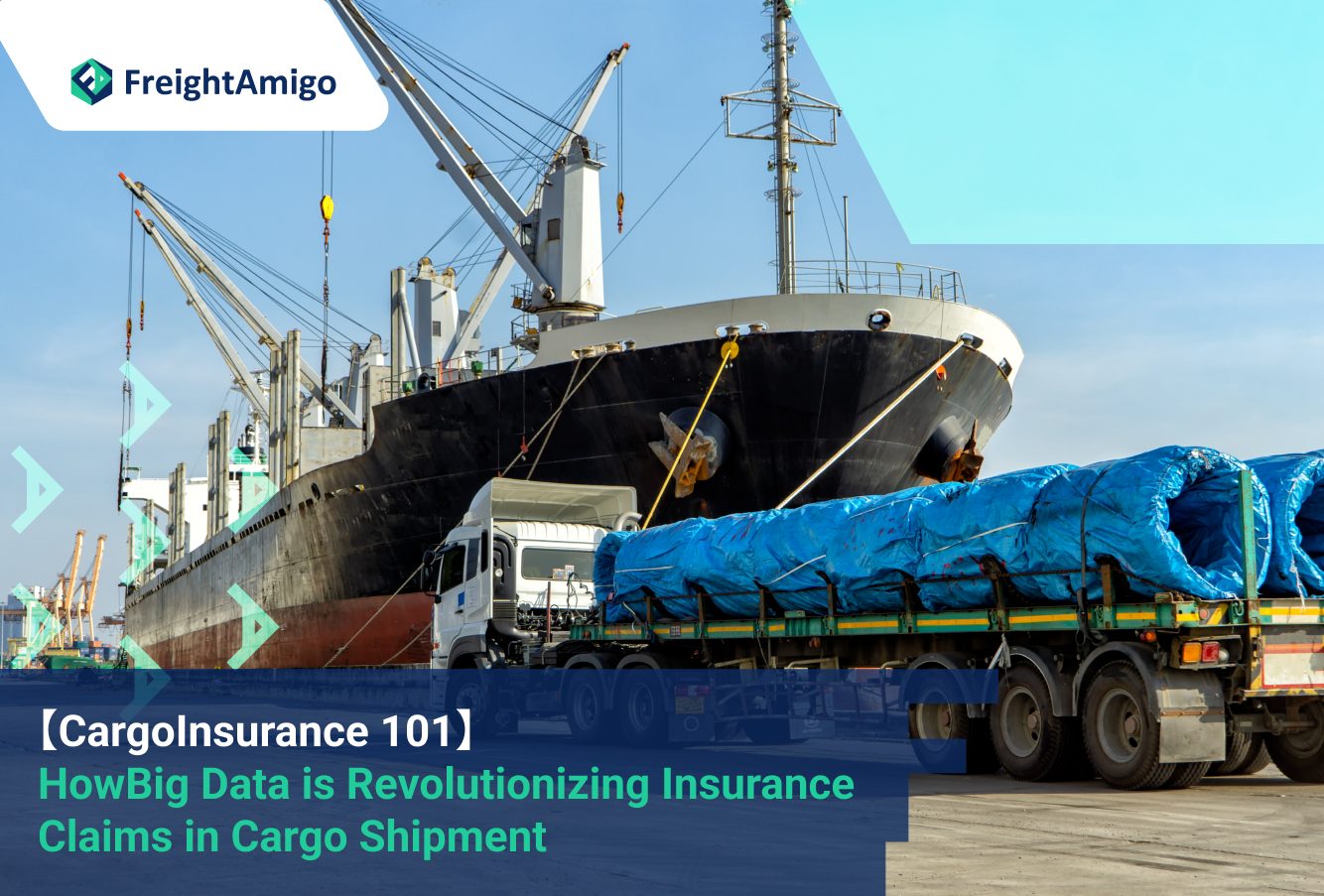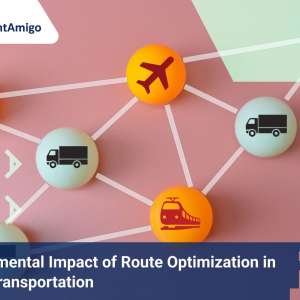Latest update on 27 February, 2024 by Jacob Leung – Marketing Analyst at FreightAmigo
In the fast-paced world of global trade and logistics, the efficient and accurate handling of insurance claims is critical for companies involved in the transportation of goods. With the advent of big data technology, the insurance industry has experienced a significant change in the way it processes claims. Big data analytics has revolutionised the insurance claims process, enabling insurers to streamline operations, enhance risk assessment and improve customer satisfaction.
Want to compare the best Express, Air Freight, Sea Freight, Rail Freight & Trucking rates so as to have better control on cost?
The importance of insurance claims in cargo shipping
Insurance claims play a vital role in the freight transportation industry. Freight transportation involves inherent risks such as loss, damage, theft and accidents in transit. Insurance coverage provides companies and individuals with financial protection against these risks, ensuring that potential losses are compensated. Efficient claims handling is essential to minimise supply chain disruption, maintain financial stability and foster trust between insurers and their customers.
The role of big data in insurance claims
Big data refers to the vast amounts of structured and unstructured data generated on a daily basis. In the context of insurance claims, big data encompasses various sources such as shipment tracking data, weather data, historical claims data and sensor data from cargo containers. These data sets are analysed using advanced analytics techniques to extract valuable insights and patterns. The application of big data in insurance claims has several key benefits:
1. Improved risk assessment
By leveraging big data analytics, insurers can gain a deeper understanding of the risks associated with cargo shipments. By combining historical claims data with real-time data on weather conditions, traffic patterns and cargo tracking, insurers can accurately assess the potential risks associated with each shipment. This enables them to price policies more accurately and offer tailored coverage options based on the specific needs of the cargo being transported.
2. Streamline claims handling
Big data analytics enables insurers to streamline the claims process. By automating several manual processes, such as data entry and document handling, insurers can significantly reduce the time and resources required to process claims. Advanced algorithms can analyse and validate claim information, verify policy details and calculate compensation amounts, ensuring a faster and more accurate claims process.
3. Fraud detection and prevention
Insurance fraud is a significant challenge for the industry, costing billions of dollars each year. Big data analytics can help insurers detect and prevent fraudulent claims by analysing patterns, anomalies and historical data. By identifying suspicious activity and patterns of behaviour, insurers can flag potentially fraudulent claims for further investigation, reducing the financial impact of fraud on the industry as a whole.
Real-world applications of big data in insurance claims
The application of big data analytics in insurance claims is not just a theoretical concept – it has already transformed the way insurers handle cargo shipping claims. Several real-world applications demonstrate the effectiveness of big data in improving the insurance claims process:
1. Intelligent premiums
Traditionally, insurance premiums are calculated based on broad risk categories, resulting in over- or under-pricing of policies. With big data analytics, insurers can offer smart premiums that are dynamically adjusted based on real-time data. By continuously monitoring risk factors such as weather conditions, traffic patterns and cargo tracking data, insurers can offer more accurate and personalised premiums, ensuring that policyholders pay a fair price for their coverage.
2. Automate claims handling
Big data analytics enables insurers to automate various aspects of the claims process. By integrating data from multiple sources, such as cargo tracking systems, weather databases and historical claims data, insurers can automate the verification and validation of claims information. This reduces the need for manual intervention, speeds up the claims process and minimises the risk of human error.
3. Predictive analytics for loss prevention
Predictive analytics, a subset of big data analytics, enables insurers to proactively identify potential risks and prevent losses. By analysing historical claims data, weather patterns and other relevant data sources, insurers can predict the likelihood of future losses and take proactive measures to prevent them. This includes implementing risk mitigation strategies, optimising transport routes and making recommendations to policyholders to minimise the risk of cargo damage or loss.
The future of cargo insurance claims
As big data technology continues to evolve, the future of insurance claims in cargo shipment looks promising. The integration of new technologies such as artificial intelligence (AI), machine learning (ML) and blockchain will further improve the efficiency and accuracy of the claims process. Here are some potential developments on the horizon:
1. AI-powered claims assessment
AI technologies can analyse large amounts of data, including images, videos and documents, to assess the validity and severity of insurance claims. By automatically extracting relevant information, AI algorithms can speed up the claims assessment process and provide insurers with actionable insights for faster decision-making.
2. Blockchain for claims transparency
The use of blockchain technology can increase transparency and trust in the insurance claims process. By creating an immutable and auditable record of claims-related transactions, insurers can ensure the integrity of claims data and prevent fraud. Blockchain-based smart contracts can automate the claims process, ensuring that policy conditions are met before compensation is paid.
3. Advanced telematics and sensor technologies
The integration of advanced telematics and sensor technologies will enable insurers to collect real-time data on cargo conditions such as temperature, humidity and impact levels. This data can be used to establish accurate baseline conditions, validate cargo damage claims, and provide valuable insights for risk management and loss prevention.
4. Collaboration and big data sharing
The future of cargo insurance claims will involve increased collaboration and data sharing between insurers, logistics providers and other stakeholders. By sharing data and insights, the industry can collectively improve risk assessment, claims handling and loss prevention strategies. Collaborative platforms and industry-wide data standards will facilitate seamless data exchange and enable more efficient claims handling.
Make Claims Easier
In conclusion, big data analytics has revolutionised the insurance claims process in the cargo transportation industry. By harnessing the power of data, insurers can streamline operations, enhance risk assessment, detect fraud and provide a superior customer experience. As technology continues to advance, the future of cargo insurance claims holds even greater potential for innovation and efficiency. Insurers and logistics providers must embrace these advances to remain competitive and meet the evolving needs of their customers.
If you are interested in using insurance claim service, you can find out more details on FreightAmigo
Read More:
【Fine Art Shipping Insurance】 Mitigating Risks and Ensuring Security
【Fine Art Shipping】 Preparation and Secure Packaging for Artwork Shipment
【Unveiling the Maze of Vase Shipment】 Navigating the Complexities of International Shipping
If you have any inquiries on logistics/supply chain, feel free to contact FreightAmigo now:
Chat with us online | Hotline: +852 28121686 | WhatsApp: +852 27467829









































